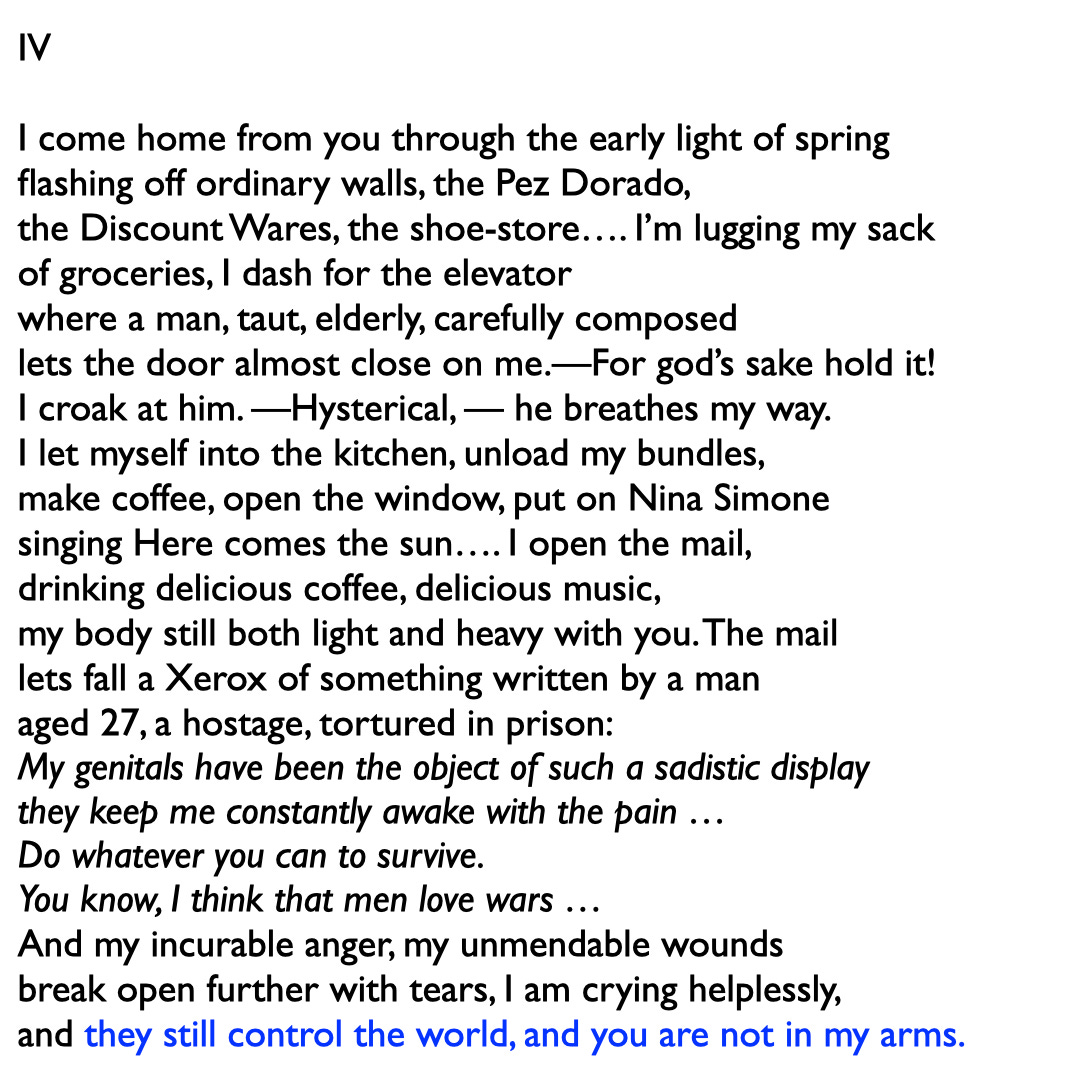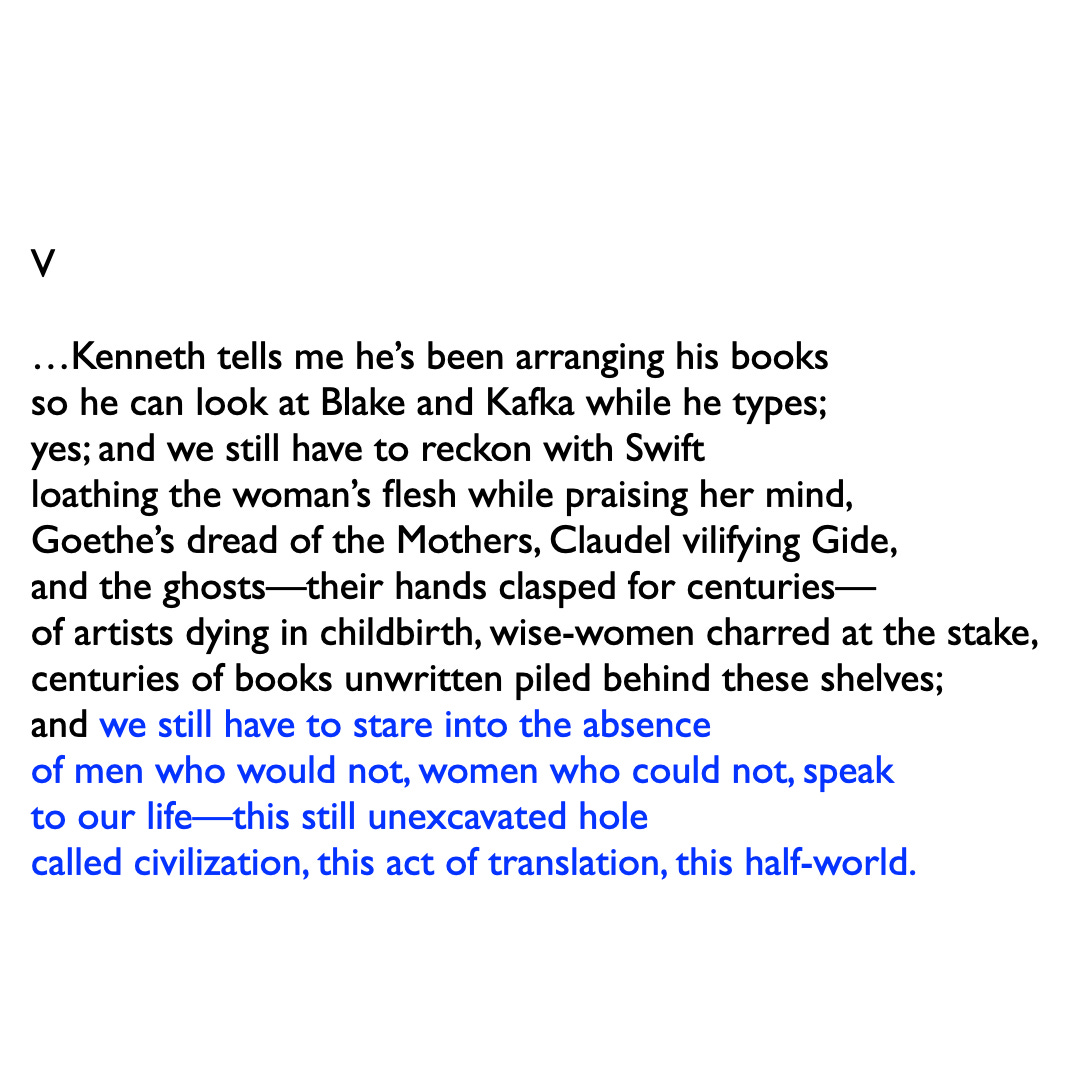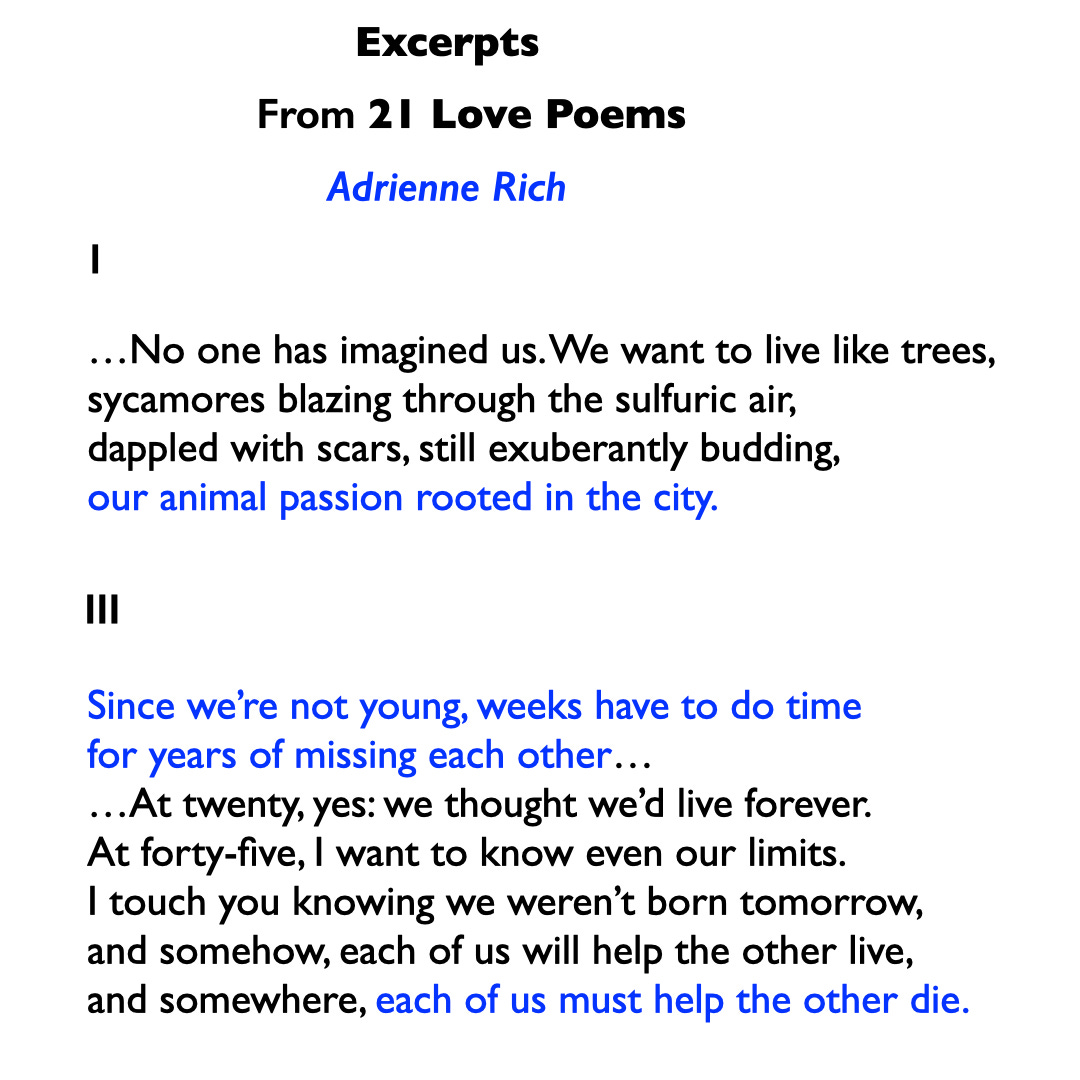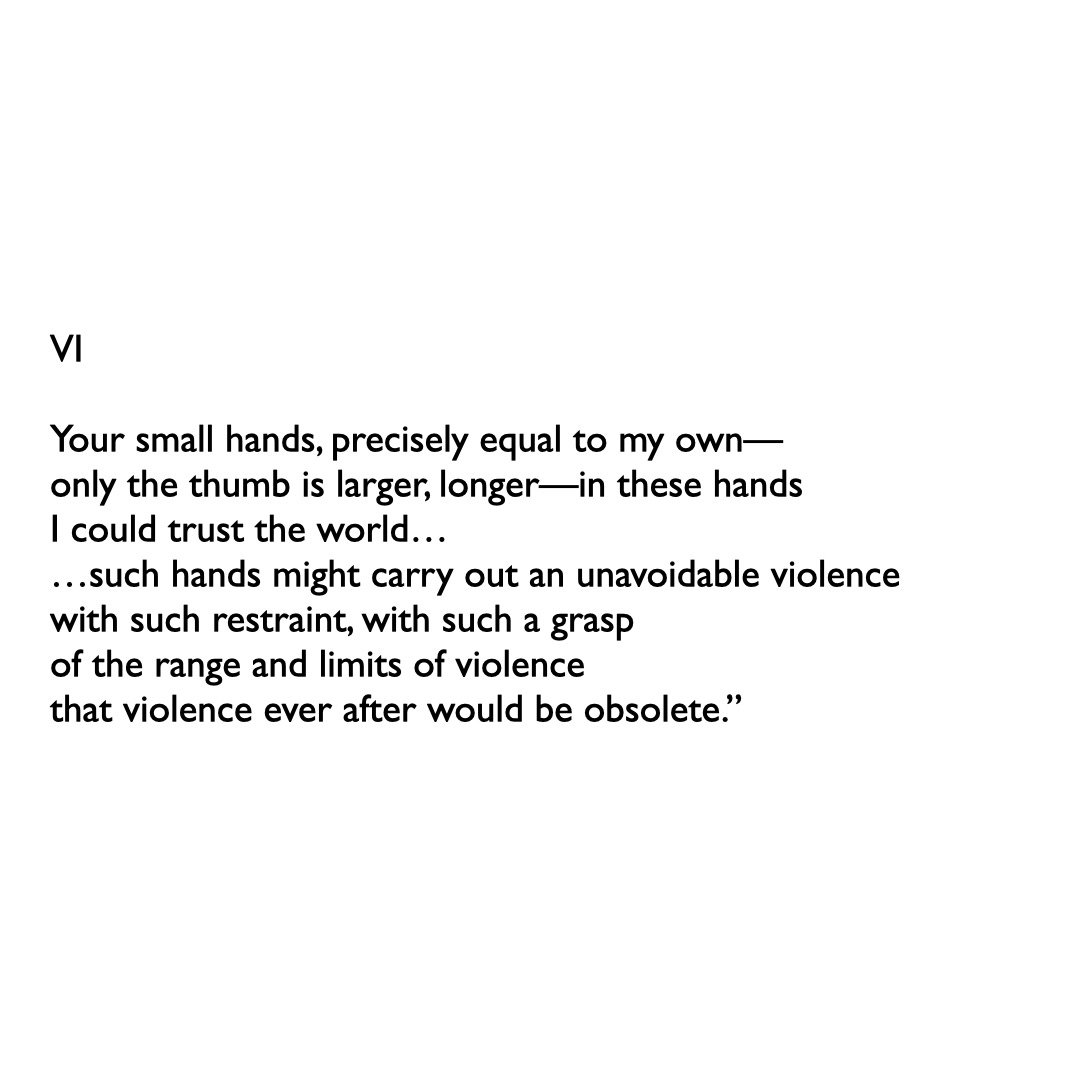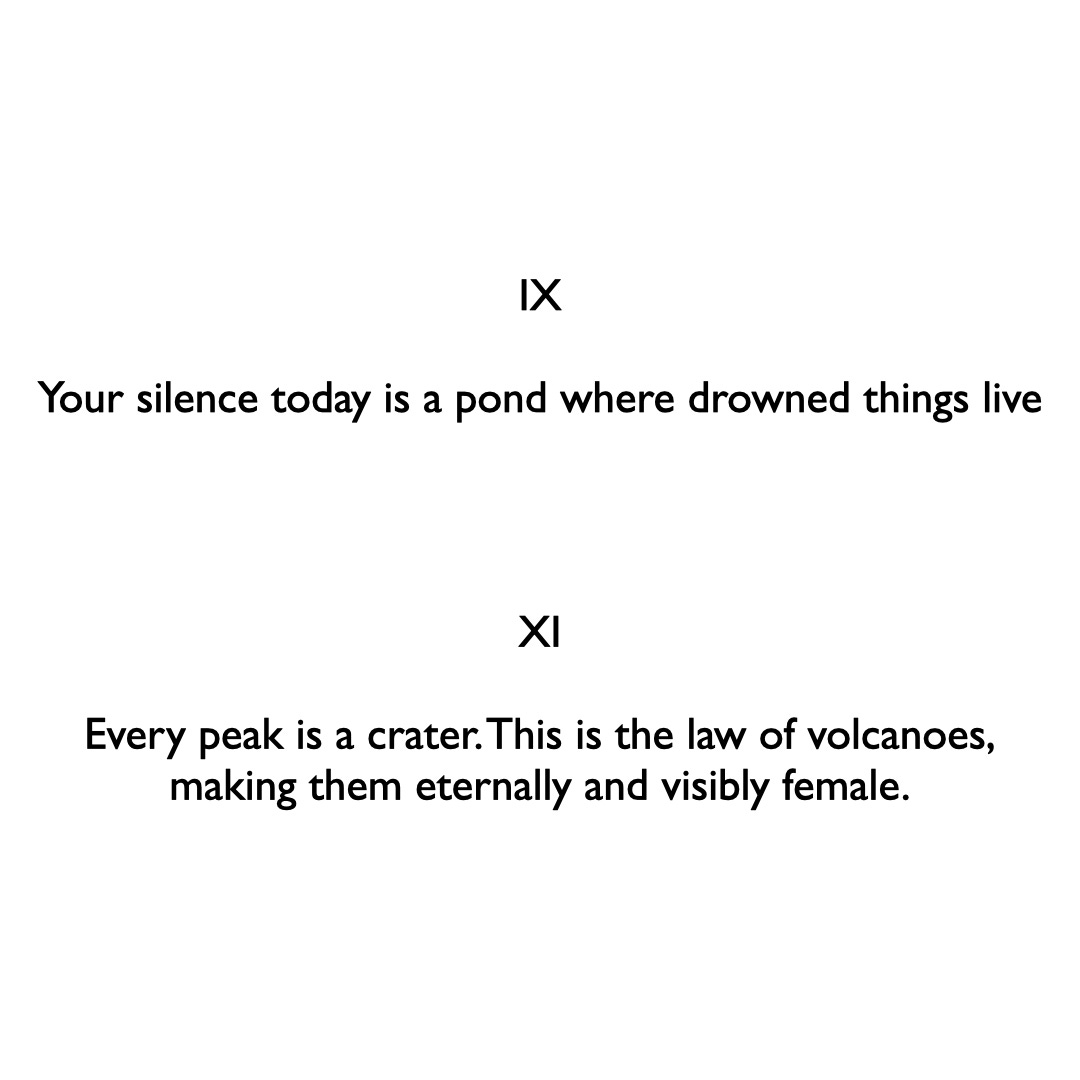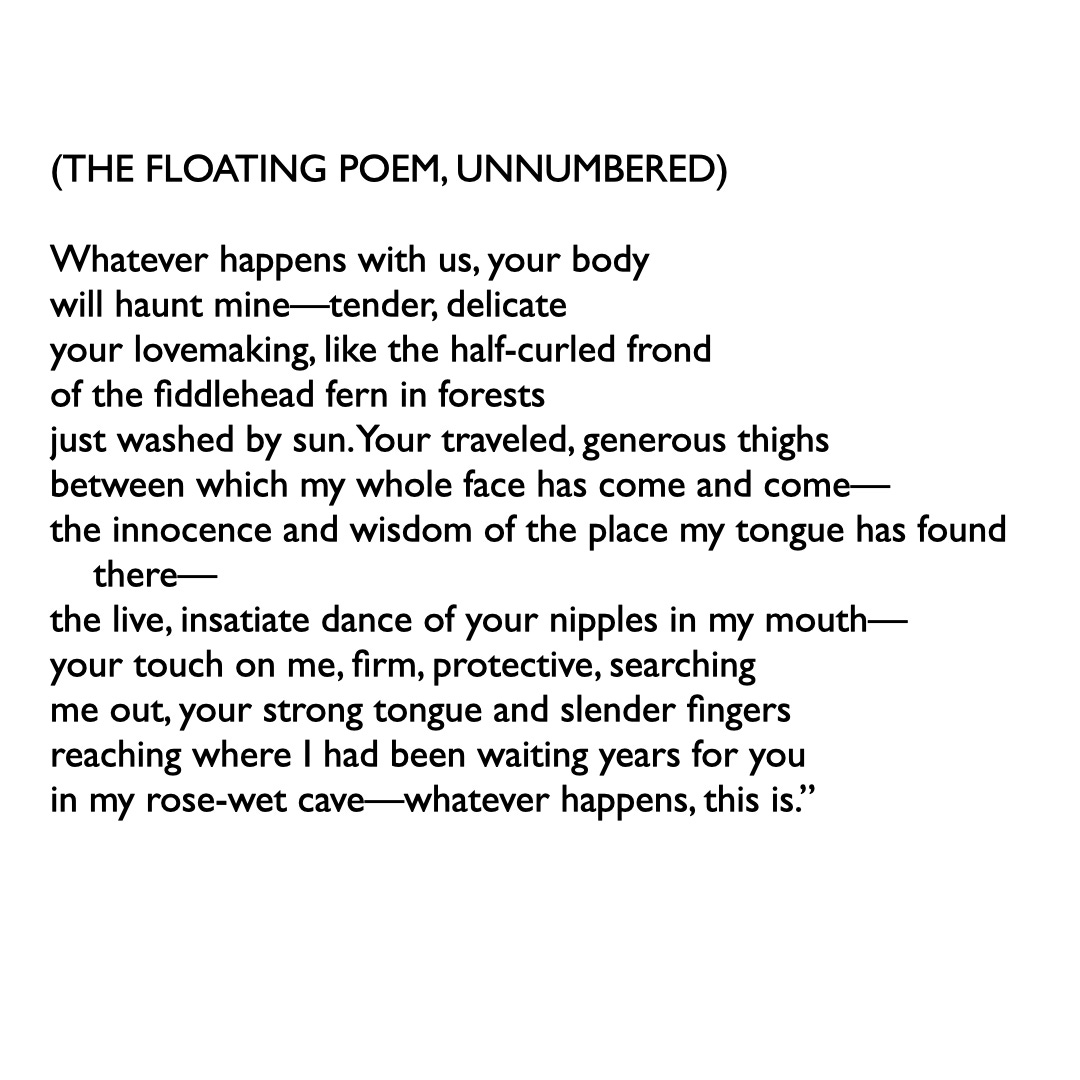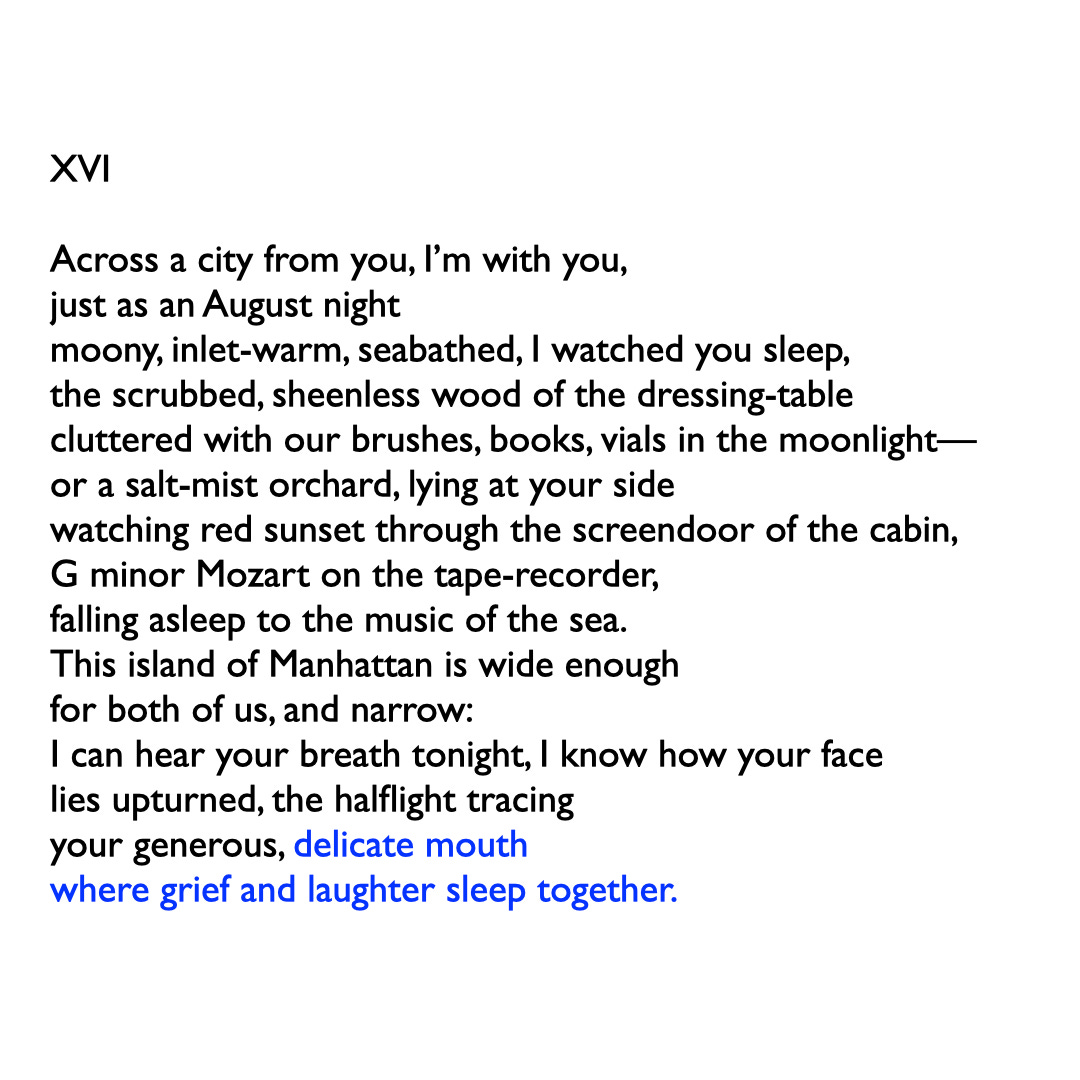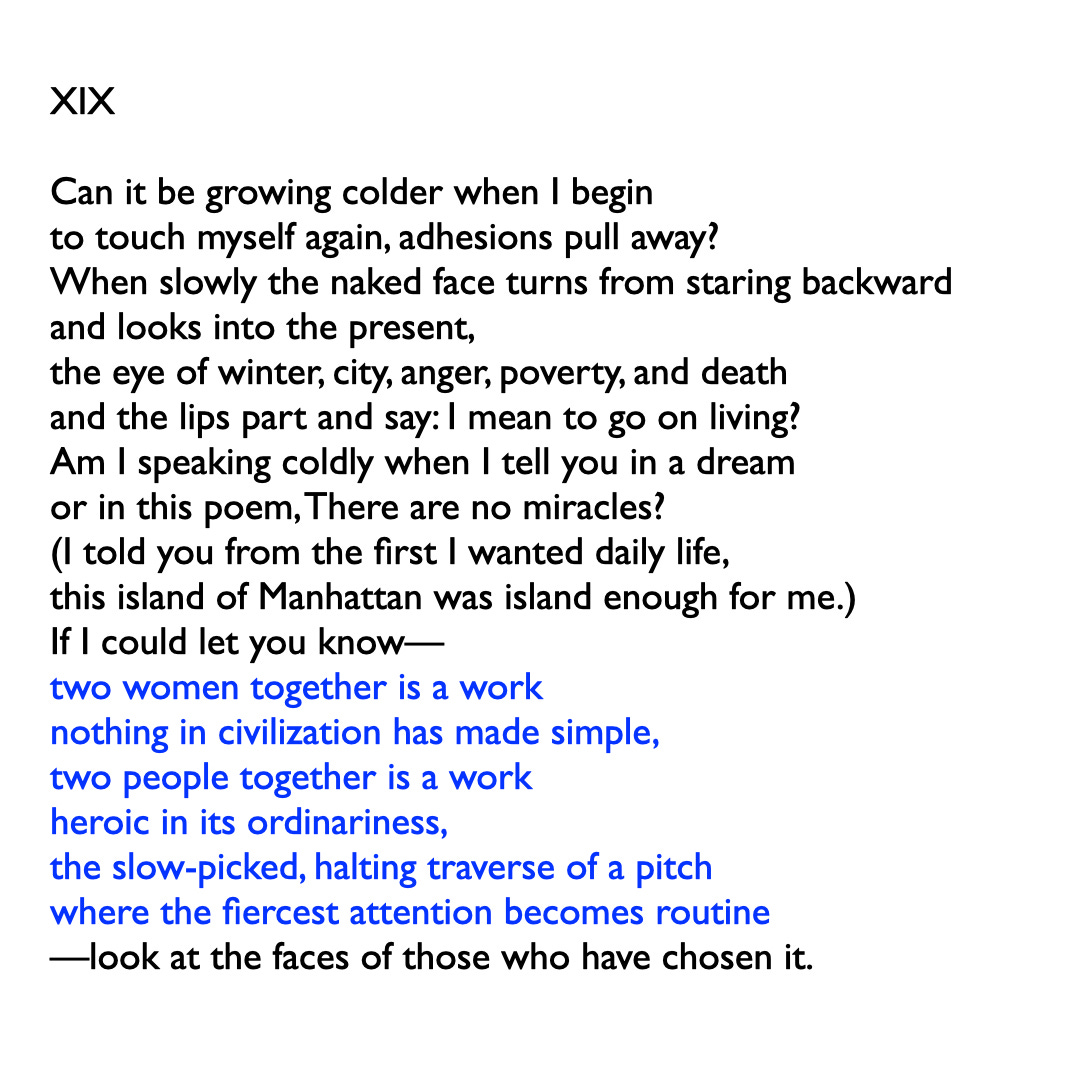Have you had the feeling of knowing a writer, of feeling like they are a good friend, somebody who understands, purely through their words? It always happens suddenly, but more often than not, the time has been toying with you, waiting for the right moment to turn love into serendipity. Perhaps, the first time, you’d chance upon a poem in some unexpected place - on the metro, while reading the news, a gift - that caught you on the very first reading. After the initial rush, you let it simmer in some obscure corner in the back of your mind, while you attend to more important looking things. But then, a few days later, the poet’s name crops up again, this time, the reference cannot be ignored. Maybe a dear friend shares something they’d written about the poet with you, or refers to the way that the poet changed the meaning of revolution for everybody who came after her. Now you make a mental note, or even copy the poem in your Notebook of Meaningful Mistakes, to go back to later. But the universal law of synchronous mystery doesn’t let you go deeper, not unless you are truly ready, when the cup of the heart is empty, and thirst is a fuzzy dream in your eyes. There is always a third…
It happens on an ordinary day. Maybe a crow has come your balcony and is being testy, you open that old bookmark, or maybe a lover tries to count the ways they love you in verse. You start to read, you make notes, you devour words with animal haste, you sigh and stop, you write - you end up on the ground, hair astray, sleepless and wordless, with poetry streaming from the corner of your mouth.
“What kind of beast would turn its life into words?
What atonement is this all about?
—and yet, writing words like these, I’m also living.”
There is companionship in language, yes. But more importantly, you sense the sound and the fury, the gathering energy that demands more, with all the clarity of an oracle. You know this feeling, it lingers at the edges of your imagination, waiting to find soil.
“And how have I used rivers, how have I used wars
to escape writing of the worst thing of all—
not the crimes of others, not even our own death,
but the failure to want our freedom passionately enough
so that blighted elms, sick rivers, massacres would seem
mere emblems of that desecration of ourselves?”
(the italics are mine)
When it finds words that do not disturb the silence from which they have arisen, this feeling is unmatched. You have found a friend, a person who sees with the same impertinence the bigotry of the universe, and writes sweet love letters to others who are waiting, who are fighting, and suffering, reiterating, that there is a silence that is beyond all experience.
“Your silence today is a pond where drowned things live”
***
Last month at a reading, one of the young poets read excerpts from Adrienne Rich’s 21 Love Poems. I had read and loved poems by Rich before, but a particular line caught my attention:
“We want to live like trees,/ sycamores blazing through the sulfuric air,/ dappled with scars, still exuberantly budding,/ our animal passion rooted in the city.”
That image stayed with me, and I went back to one of my favourite Rich poems, a popular one - What Kind of Times are These. I used to think of Rich as a political poet, but also, a poet of ‘progressive love’. I found in her writing the sensitivity of a dewdrop refracting the forest, enlivening the eye that it graces. What power there is in a revolution whose voice is that of a tender lover, a flaming romantic!
In an essay entitled “Woman and Bird”, Rich writes about a bird that comes to her courtyard and starts a train of thoughts:
A Mohawk Indian friend says she began writing "after a motor trip through the Mohawk Valley, when a Bald Eagle flew in front of her car, sat in a tree, and instructed her to write”…I made no claim upon the heron as my personal instructor. But our trajectories crossed at a time when I was ready to begin something new, the nature of which I did not clearly see. And poetry, too, begins in this way: the crossing of trajectories of two (or more) elements that might not otherwise have known simultaneity. When this happens, a piece of the universe is revealed as if for the first time. (Italics mine)
This is the conversational power of poetry, that it brings together unfamiliar things, and in the passionate cockfight that ensues between the secret passions of the heart, and the burning everydayness of the real, in the midst of a festival of grief, or love, there is a momentary camaraderie, where experience turns into metaphor.
“Human eyes gazed at each of all these forms of life and saw resemblance in difference—the core of metaphor, that which lies close to the core of poetry itself, the only hope for a humane civil”
Rich inhabited multiple selves, identities lashed into being with the surrender of radical belief. I see in her words a glowing red badge of loyalty. not the throwaway ‘loyalty’ of first-love, promises built around unattainable union taught in film and popular culture; but a loyalty that is wound carefully around the realisation of a shared space. This is beyond kin, beyond, even natural things. In loving fiercely, she showed the possibilities of a politics of equality, and a radical imagination of freedom.
What fire is there in this exhortation? How she breaks the horror of toxic masculinity like an ugly surge of sea on the granite shards of her words - they still control the world, and you are not in my arms. To bring together the tortuous and the tender with such sparseness and irony is beyond mastery. It does not feel like some path breaking political commentary, it is simply an account of watching and experiencing a world where the male gaze has turned into a weapon. That last line still rings with the same fervour, and her fury is a thorn in the sides of our collective conscience. But this is a love poem is it not? Rich is at her ‘progressively’ romantic best.
Those poets who write because they know no other way, because otherwise, they will implode, they see their art as translation, as another voice in the chorus of the multitudes who stand and wait, for a message, for absolution. They disdain verse with the swagger of those whose vision sees something that is beyond, something that sustains. I think Rich was one of them. That she thought deeply about a broken world, that she lived by example and was strident in her activism has been established by several commentators. In an article written a few days after her death in 2012, Ranjit Hoskote refers to how “...one of the lasting achievements of Rich and her contemporaries is the dissolution of the patriarchal control over positions of privilege and articulation that had once been the norm.” He also talks about this brand of poets that trailed fire, with ‘painful self-questioning’. Rich’s writings are filled with this recognition of the same wound, that is fresh even after decades, and the blood that refuses to clot. In talking about the value of poetry, and the way her country refused to recognise its power, in an essay entitled “What would we create?”, Rich lists the stories of poets through the ages, who wore their poetry on their naked breasts against tyrants and oppressors of every colour:
“This is the difference between the United States and Turkey in the late 1930s, when the revolutionary poet Nazim Hikmet was sentenced to twenty-eight years in prison "on the grounds that the military cadets were reading his poems." This is the difference between the United States and Greece, where, both in the 1930s and after World War II, the socialist poet Yannis Ritsos was interned in concentration camps, exiled, placed under house arrest, his writings burned. This is the difference between the United States and the Stalinized Soviet Union, when the poet Osip Mandelstam (among countless other writ- ers, in Russian and Yiddish, murdered in those years) was per- secuted and exiled for an anti-Stalin poem, or, in the 1970s, the poet Natalya Gorbanevskaya sent to a "penal mental institution," or, in the 1980s, the poet Irina Ratushinskaya to a prison for "dangerous state criminals." This is the difference between the United States and Chile in 1973, where the junta who came into power the day of Pablo Neruda's death sacked the poet's house and banned his books.”
Rich stood witness to her time, and in her testimony we let our own fights, our own suffering, our own hopes dissolve. In the same essay she paints a dire picture, which is devilishly close to what we are experiencing today.
October 1990. Time to say that in this tenuous, still unbirthed democracy, my country, low-grade depressiveness is pandemic and is reversing into violence at an accelerating rate. Families massacred by fathers who then turn the gun on themselves; the deliberate wounding and killing of a schoolyardful of Asian-American children in a small California town; mass or serial murders of university students in Berkeley and Florida. Violence against women of every color and class, young dark-skinned men, perceived lesbians and gay men. More and more violence committed by children—against themselves, each other, adults: suicides, gang warfare, patricide and matricide. And the violences, violations obscured because they happen in places and to people that are out of sight, out of mind. Much violence that doesn't make the evening news, committed against people in prison, or prostitutes, or American Indians, or undocumented immigrants, or in nursing homes and state hospitals, or just part of Saturday night after a few drinks.
It might seem bleak, but Rich thought of this and when she wrote, her pen courted fervent fire, making steady, sharp incisions on the bark of a consumerist, self-involved society. Even as she acknowledged the possibility of self indulgence she overturns this impulse with the breath of metaphoric release. In the naked politics of blank verse there can be no manipulation. Poetry in its very freedom disallows framing, and resists the market and Machiavelli. Poetry makes friends, and advances.
What is political activism, anyway? I've been asking myself.
It's something both prepared for and spontaneous—like making poetry.
When we do and think and feel certain things privately and in secret, even when thousands of people are doing, thinking, whispering these things privately and in secret, there is still no general, collective understanding from which to move. Each takes her or his risks in isolation. We may think of ourselves as individual rebels, and individual rebels can easily be shot down. The relationship among so many feelings remains unclear. But these thoughts and feelings, suppressed and stored-up and whis- pered, have an incendiary component. You cannot tell where or how they will connect, spreading underground from rootlet to rootlet till every grass blade is afire from every other. This is that "spontaneity" which party "leaders," secret governments, and closed systems dread. Poetry, in its own way, is a carrier of the sparks, because it too comes out of silence, seeking connection with unseen others.
I share with you a selection of excerpts from Rich’s 21 Love Poems - the two excerpts shared earlier in this post are from that same collection (apologies for the length of this post, but I would urge you to read Rich’s writings in the original).
I Just wanted to say ki…do write in with responses if you feel like. Write in if you’d like me to share more poems with you privately, or you want to discuss, or if I’ve left out something that you felt was important (if you’ve read more Adrienne Rich that touched you - I’d love to hear!).
It is a difficult time. Talking poetry helps, sometimes. I wish you and yours safety and good health, and I am confident that we will weather this storm together :)
If the poems and the commentary resonate with you, do consider ‘buying me a coffee’. (Matlab, if you can’t, that’s also fine, obviously. This is a free newsletter)
Note: Those, not in India, who’d like to support the work I do at Poetly, do write to me - poetly@pm.me. (Paypal seems to have left the building, still figuring it out)
Thanks for reading Poetly! Do subscribe if you are not reading this in your inbox. Cheers!



